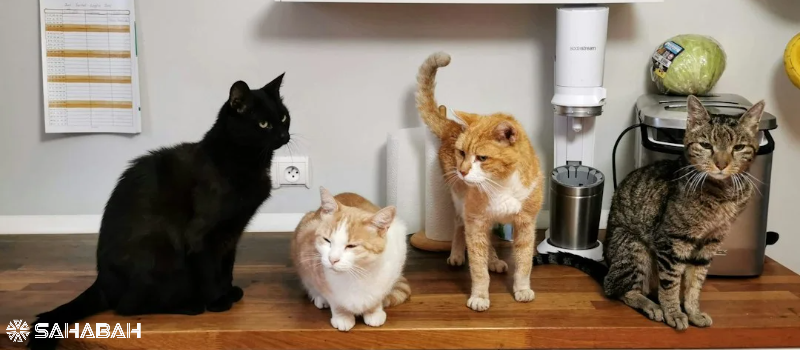Eating cat meat is a controversial topic in Islam. While most Muslims around the world do not consume cat meat regularly, questions around its permissibility come up occasionally. This causes confusion among halal-conscious Muslims looking for clear rulings.
In this in-depth blog post, we will thoroughly analyze if domestic cats are allowed to be eaten according to Islamic scriptures and scholarly opinions. We will also comprehensively overview the cultural stigma around cat meat in Muslim societies and discuss global examples of its consumption and trade.
Defining Halal and Haram in the Quran and Hadith
In Islam, laws and guidelines around permitted (halal) and prohibited (haram) foods are derived from the holy texts of the Quran and authenticated narrations of Prophet Muhammad’s (pbuh) sayings and actions known as hadith.
The Quran clearly defines some food categories as strictly haram for Muslims to consume:
- Pork and pork products
- Alcohol and other intoxicating substances
- Meat from animals that died of themselves, were strangled, beaten, fell from a height, gored by horns, or attacked by wild animals (carrion)
- Meat that is not slaughtered properly and correctly dedicated as per Islamic guidelines
- Meat slaughtered and offered in the name of an entity other than Allah
However, the permissibility or impermissibility of many modern types of food are not directly addressed in the core Islamic texts since these items were non-existent during the prophet’s time. In order to determine their halal status, learned Islamic scholars carefully analyze the Quran and hadith to derive broader principles about food in Islam. These scholars may then issue religious rulings and fatwas based on their analysis and conclusions on newer food-related topics and issues affecting Muslims today.
Disagreements can arise between scholars’ conclusions, however, leading to differing fatwas regarding the same food item. This causes confusion among halal-conscious Muslims looking for clear and definitive guidance on what they are permitted to consume.
Regarding meat consumption specifically, the prescribed Islamic method of slaughtering permissible animals, known as dhabihah or zabiha, is crucial for the meat to be considered halal. As per this slaughtering process, animals must be killed swiftly with a sharp knife causing rapid blood loss by cutting the throat and the mentioning of Allah’s name at the time of slaughter. This ritual process of animal slaughter and the related prayers offered make the meat spiritually clean and permissible for consumption by Muslims.
Is Cat Meat Explicitly Allowed or Forbidden in the Islamic Texts?
After careful examination, the Quran and authenticated collections of hadith narrations do not directly address or clearly specify the topic of eating domestic cat meat in particular.
Among the thousands of narrations compiling the sayings and traditions of Prophet Muhammad (pbuh) over his life, scholarly analysis has found only one hadith directly dealing with the consumption of cats:
Jabir bin Abdullah reported: “The Messenger of Allah (صلى الله عليه وسلم) forbade eating the cat and from paying for the dog.” (Ibn Majah 3367)
In this hadith prohibiting consumption of cats, the subordinate clause “and from paying for the dog” refers to another separate prohibition regarding buying and selling dogs. Based heavily on this solitary explicit hadith, the majority of Islamic scholars throughout Muslim history have ruled that cat meat is clearly religiously prohibited (haram) for Muslims to eat.
However, a minority of scholars contend that this hadith only shows impermissibility rather than absolute prohibition. They argue that cryptic nature of relying on a singular narration requires a more holistic analysis. These dissenting scholars more liberally interpret other general Quranic verses and principles to state that cat meat is conditionally permissible given certain parameters.
But in order to understand exactly why most Islamic experts staunchly declare cat meat as religiously forbidden with such certainty, we must analyze the reasoning and rationale behind their prohibition rulings beyond direct scriptural evidence.
The Broader Principles Behind Islam’s Rejection of Cat Meat
While scriptural evidence is lacking, broader Islamic legal principles establish understandable reasoning behind cat meat impermissibility:
1. Cats Possess an Impure (Najis) Spiritual Status in Islam
According to classical Islamic jurisprudence manuals and scholarly treatises, cats (alongside dogs) have a special spiritual ranking among animals. Due to their normal bodily functions and habits, cats are deemed as carriers of spiritual impurity or najasat, similar to pigs.
Consumption of impure animals textual sources is clearly prohibited. And since cats frequently lick themselves and humans with their tongues, their saliva and fur transfers spiritual impurities to objects they interact with.
This fear of contamination means food containers touched by cats cannot be used by practicing Muslims without extensive cleansing rituals. And ingesting impure meat like cat flesh would inflict even more severe spiritual pollution.
2. Inability to Properly Slaughter Cats Through Orthodox Islamic Method
As outlined earlier, specific sacred Islamic slaughter practices must be obligatorily followed to sanctify and make meat spiritually clean and religiously permissible.
With cats and dogs, their domestic status and free-roaming habits make it realistically difficult to ensure they are legally killed under proper slaughter guidelines. Capturing stray cats poses immense problems in humanely restraining them to accurately slit their throat invoking Allah’s name.
Improper slaughter leaving animals to painfully bleed out also Raises concerns of needless cruelty surrounding cat slaughter. All these factors combine to make cats prohibitively difficult to slaughter in the exact stringent method that Islamic law demands.
3. The Special Spiritual Significance of Cats in Islamic History and Tradition
According to authentic Islamic history, cats had a beloved and respected status in the household of Prophet Muhammad (pbuh) and early Muslim society during Islam’s foundation.
The prophet raised a pet cat named Muezza who he let sleep on his cloak. And since harming cats cruelly contradicts Prophet Muhammad’s (pbuh) personal kindness to them, classical jurists applied the legal methodology of scholarly preference (Istiḥsān) to specially forbid Muslims from eating cats.
This unique veneration of cats among all animals explains why most Muslim majority cultures even today generally refrain from eating cat meat considered unthinkably abhorrent.
4. Scholarly Analogical Deduction with Other Haram Meat Sources Like Dogs
Among Islamic jurisprudence’s approved legal reasoning tools, analogical deduction or Qiyas represents another avenue scholars historically used to prohibit cat meat.
Cats bear extremely close resemblances and relations to pet dogs prohibited in Islam – sharing space in Muslim households worldwide. Since Islamic texts clearly forbid canine flesh for consumption, early scholars extended this prohibition to cats based on recognizable similarities.
This reasoning also applies to contemporary cultural attitudes in Muslim communities that react viscerally to cat slaughter the same way most non-Muslims view dog killing. Such strong reactions stem from familiarity with both species in domestic settings.
Regional Examples of Cat Meat Production and Consumption
Despite global Islamic academic institutions and religious bodies repeatedly forbidding cat meat and confirming its prohibited (haram) status over the centuries, consumption and trade still occurs in select areas:
China and Vietnam
In certain regional Chinese and Vietnamese non-Muslim cultural festivals like the Lychee and Dog Meat Festival, cat meat is sold alongside dogs for seasonal dishes because both animals are considered vermin pests.
Ritual disposal of strays through mass slaughter raises international animal rights activism. But local residents argue minimizing overpopulation of diseased stray cats takes priority over ethical concerns about regulated slaughter techniques used on the meat.
Peru
In the rural peasant communities of Peruvian Andes mountains, ancient native Incan beliefs persist claiming medicinal properties of cat meat. Locals do not view felines as regular food except in home remedies and traditional cat-meat recipes believed to relieve respiratory diseases like asthma.
These isolated cultural practices make regulation difficult between safeguarding indigenous heritage versus confronting accusations of unethical cruelty and public health violations around this specific cat meat usage.
West Africa
Similarly, secretive underground rituals involving cat meat symbolically occur in parts of West Africa like Nigeria and Ghana. Specific body parts like leopard hearts and heads are coveted for witch doctors and traditional herbalists prescribing them as alternative treatments.
But while only served discreetly to paying customers, these rare ritualistic uses still lack regulation around unsanitary conditions when using cat meat and fuel the exploitative poaching of threatened leopard populations.
Global Cultural Attitudes Towards Cat Meat Vary Between Communities
As the inconsistent examples indicate, localized socio-cultural backgrounds dramatically impact how cat meat is perceived. Eating feline flesh inconsequential to some regional cultures remains incredibly taboo for others. These conflicting culinary attitudes tie into value systems of what constitutes meat versus pet.
As the world globalizes into a melting pot of traditions and perspectives, such ethical dilemmas pit cultural relativism against activist uproar. Arguments claiming customary heritage justify cat meat get countered by animal rights groups prioritizing empathy cutting across cultural boundaries.
Additionally, the communities who view stray cats as disposable vermin needing population control through regulated slaughter mechanisms argue contrary to those decrying such systemic disposal as intrinsically speciesist and cruel.
Frequently Asked Questions: Is Cat Meat Halal?
No, it is forbidden in Islam to consume cat meat as it is considered haram, or unlawful, to eat certain animals, including cats.
What does halal food mean in Islamic dietary law?
Halal food refers to food that is permissible according to Islamic law, and must be prepared following specific guidelines and practices set by Islamic dietary law.
Can cats be given non-halal or haram meat as pet food?
It is not permissible to feed cats non-halal or haram meat, as it goes against Islamic dietary law to provide animals with food that is not lawful according to Islamic guidelines.
Is it allowed to feed halal cat food to Muslim-owned cats?
Yes, Muslim cat owners should ensure that the food provided to their cats is halal, meaning it meets the requirements set by Islamic dietary law for permissible consumption.
Where can I find halal cat food or halal certification for pet food?
Halal cat food and pet food with halal certification can be found in stores or online retailers that specialize in providing lawful and permissible food products adhering to Islamic guidelines.
Is it permissible to feed cats food that contains non-halal ingredients?
It is not permissible to feed cats food that contains non-halal or forbidden ingredients, as it goes against Islamic dietary law to provide animals with unlawful food.
What are the consequences of feeding haram meat to cats according to Islamic law?
Feeding haram meat to cats is considered unlawful and may have religious implications for the individual responsible, as it contradicts the principles of halal consumption and proper care for animals in Islam.
What is the significance of permissible things in Islamic dietary law?
Permissible things, or halal, play a crucial role in Islamic dietary law, which outlines the lawful and permissible practices and guidelines for consumption, including the types of food and meat that are permissible for Muslims to eat.
Can Muslims eat any type of meat other than haram meat?
Muslims can eat any type of meat that is considered halal and lawful except for the specific types of haram meat that are prohibited in Islamic dietary law, such as cat meat, donkey, and others.
What did the Prophet Muhammad (peace be upon him) narrate about consuming certain types of meat?
The Prophet Muhammad (peace be upon him) narrated and emphasized the importance of consuming only lawful, halal meat and food, while forbidding the consumption of certain animals, such as cats and dogs, in Islamic dietary law.





